The Ultimate Buyer Keywords Guide for More Sales
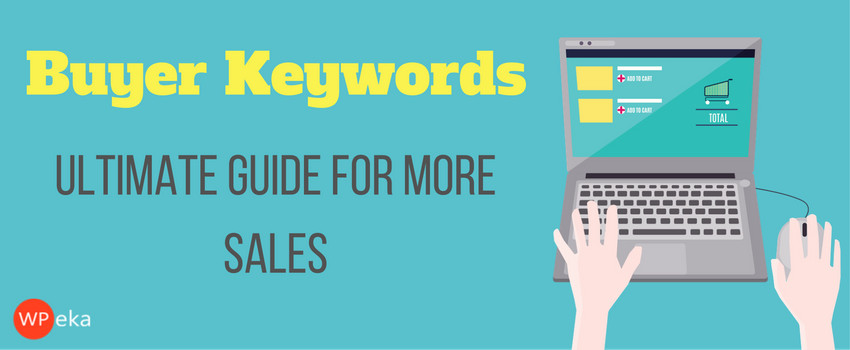
Keywords are the foundation of SEO. Without keywords, there is no SEO.
Of course, if you are looking to boost your search results, proper keyword research is the place to start. But, all keywords are not created equal.
Some keywords will certainly give you more bang for your buck when it comes to the all important conversion rate. These are the keywords and phrases you should be going after.
While search volume is an important metric when you’re trying to figure out the value of a keyword, lots of traffic isn’t worth much at all if the keyword you’ve chosen is not driving conversions. So if it’s not all about traffic, what else can you use to determine the right keywords for making your business successful?
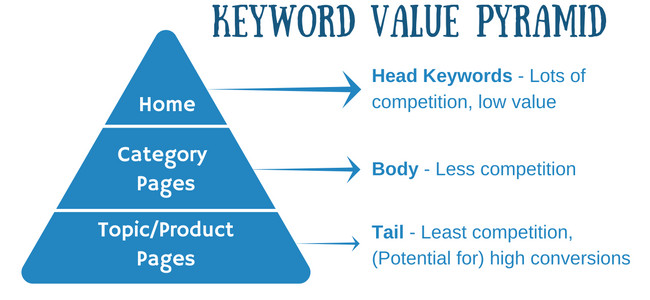
There is another, more important, factor that can be used to determine the efficiency of keywords in converting visitors into actual sales revenue.
All marketers today have so many high-quality keyword analysis tools at their fingertips. You too have the metrics available that can show you much more than just the search volume for keywords you are interested in.
What you really want to be doing in your research is looking for high commercial intent keywords, also known as buyer keywords.
These little gems are like a call from prospective customers saying they are ready to buy.
In this guide, we will give you an overview of buyer keywords, some examples of buyer keywords, and a few tools you can use to do your own research to find the best list for your business.
What are buyer keywords
In the simplest of terms, buyer keywords are the words your target audience is using to search for your product online.
But, these are not just any words. We all know that buying a product is a process. Therefore, depending on the words used in the search, you can fairly easily guess where the customer is in regards to their level of intent in the purchasing process.
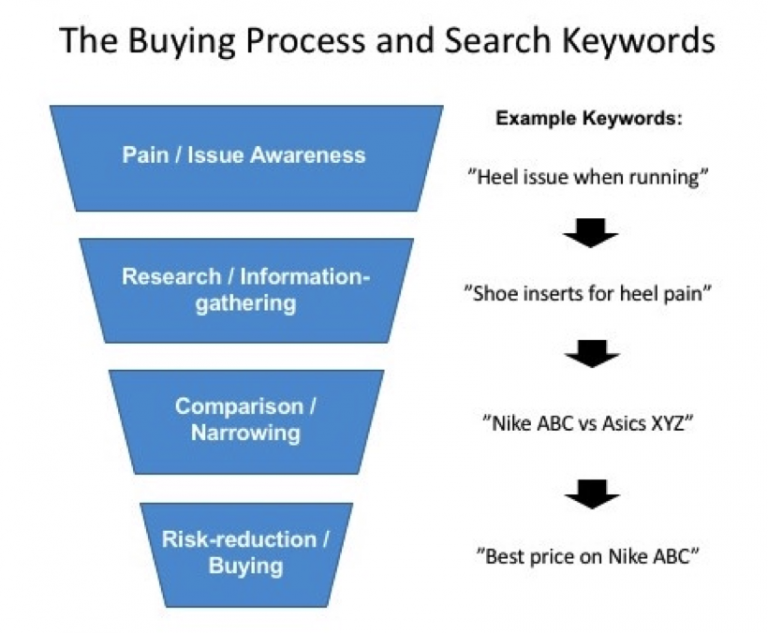
When used in a search phrase, certain words show that a customer has already determined they have a need. These words can also indicate that they have likely already done the research necessary to narrow down their list of potential products that could satisfy this need.
The most obvious words, such as “buy” and “discount, can indicate that the customer is actively in the buying process and determining which solution they want to purchase.
These words are called buyer keywords and are any word or phrase that indicates an intent to buy. The words can vary by industry and this is one of the reasons why buyer keyword research is so important.
How to find the intent of a keyword
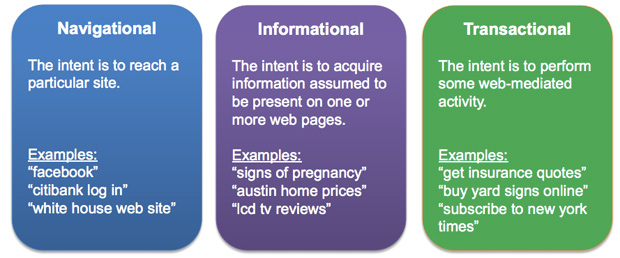
There are three basic types of keyword searches:
- Informational or Ad Hoc – Searchers use these words and phrases to answer questions or learn more about what’s available for their need or question
- Navigational or Known Page – Searchers use these terms to find a particular website or document; one they are already familiar with.
- Transactional or Product Specific – These are the searches used to actually buy a product and they often contain similar words across industry (but not always).
How do you find the intent of a keyword used in one of these searches? There are several tools you can use to determine objectively and subjectively the commercial intent of specific keywords or keyword phrases. We will describe a few of the more popular tools later in this guide.
Generally, buyer keywords indicate that the user is pretty far down in the buying funnel and are ready to convert. In fact, buyer keyword search queries are the highest converting keywords, and you can generally correlate them directly with your marketing dollars spent.
How to find buyer keywords

Some good advice for any keyword research project is to find your niche keywords. While the common and top ranked keywords are great to shoot for, a better strategy may be to find your niche in the big wide world of keywords. In fact, niche keywords may be the most profitable keywords in your market.
A niche is really just a segment of a larger market, one that you can try to dominate. To find your niche, and then determine the best buyer keywords for that niche, you can use several approaches including:
- Mind Maps – You can use software or old-fashioned pen and paper to brainstorm ideas related to the larger market. You should easily come up with five niches.
- Buyer Personas – Forming an image of the typical buyer (or several) is a great way to create new ideas about what specific people might be attracted to.
- Forum Research – Stalking user forums for your industry is an effective way to learn what customers are actually saying and to find the new niche possibilities to meet their needs.
Once you’ve found your niche, you’ll want to determine the best buyer keywords for that niche. Here are some examples and also some tools to get you started.
Best buyer keywords
Depending on your industry, some keywords are stronger than others. For example, in service industries, such as the legal industry, the word “buy” may not be as profitable. Searchers in this industry, who are really considered leads, may be more likely to use the word “best” to indicate their intention to hire a lawyer.
Here are a few examples of strong buyer keywords, covering many industries:
- Buy
- Review(s)
- Discount(s)
- Deal(s)
- Cheapest
- Affordable
- Comparison
- Best
- Top
- Coupon(s)
- Free Shipping
- Product Specific (Samsung Galaxy)
- Brand Specific
- Category Specific (winter coats)
These were some of the most popular buyer keywords. If you want the ultimate list of keywords, check out the infographic below.
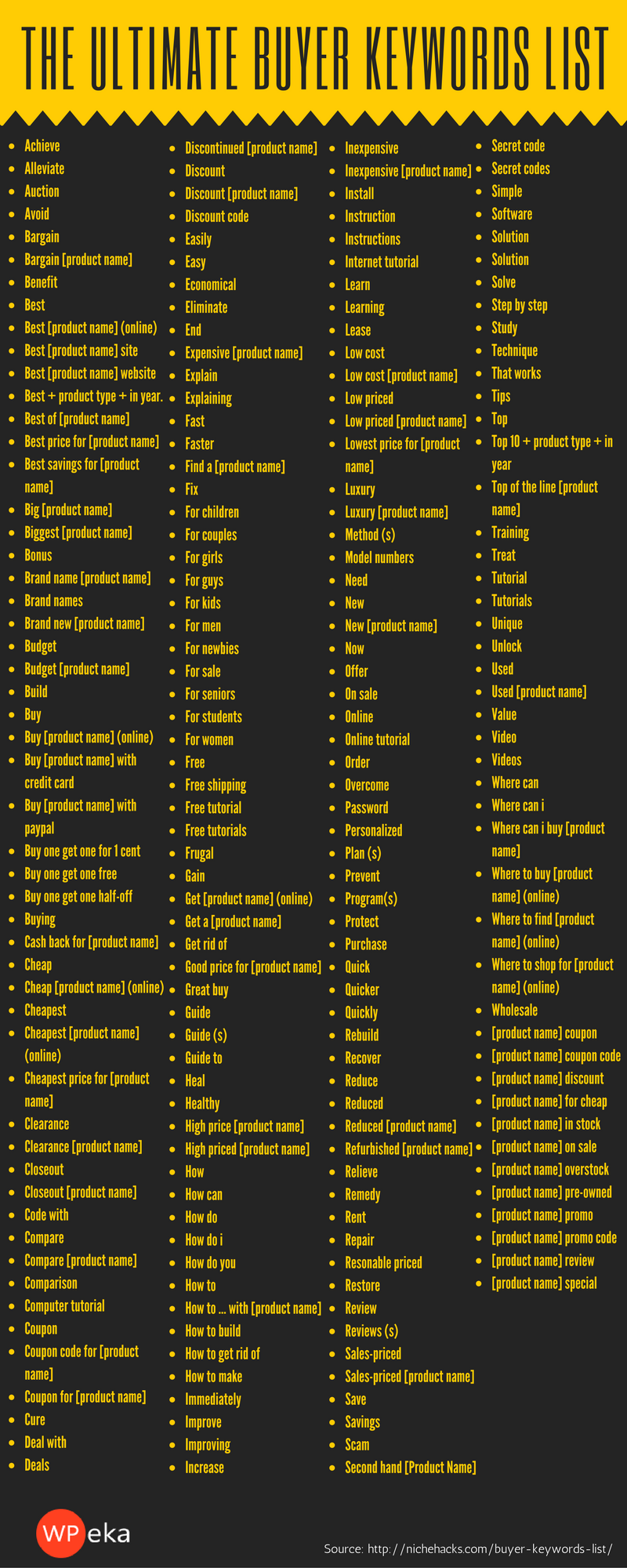
You may save this infographic for future use, it will work as a cheat sheet.
Buyer keywords research tools
Google AdWords Keyword Planner

When you’re ready to conduct your buyer keyword research, one of the most powerful tools available is the Google AdWords Keyword Planner. Using the Planner, enter your product or service and click on the “Keyword Ideas” tab and you’ll see a long list of keywords suggestions. From here, you can drill down into some data like historical performance and even get some ad group ideas.
UberSuggest

UberSuggest takes the Google Suggest results and adds every letter of the alphabet after your term, in order to generate hundreds of keywords. This is a quick and easy way to create a buyer keyword list, and though many of the suggestion may not be applicable to your needs, several will. This tool is a great idea generator and can even help with finding niche words.
ScrapeBox

ScrapeBox is similar to UberSuggest, but its Keyword Scraper tool yields many more results. And, ScrapeBox lets you remove duplicates and copy the list to a CSV file. From there, you can do your more in depth research on the list using Google AdWords Keyword Planner.
Moz Keyword Explorer

Moz provides a keyword research tool with powerful metrics that can make the job of building a strong buyer keyword list a little easier. Moz provides metrics from monthly search volume data for volume, difficulty, opportunity, potential, along with a SERP analysis breakdown of a pages link and social data. Moz Keyword Explorer is free to try.
Microsoft Bing Ads Intelligence Tool

Microsoft’s keyword research and optimization tool, known as Bing Ads Intelligence, helps you build your keyword list based on their performance in the Bing network.
Bing Ads Intelligence helps you perform keyword research based on many criteria including traffic, performance, age and gender groups, location, and the estimated bid. You can also dive a little deeper with research into associated keywords, related searches, and keyword categories.
Finding the Best Buyer Keywords for Increased Sales
Keyword research is so much more than tracking the volume and bid price for a search word or phrase.
If you don’t factor in commercial intent, you may find yourself ranking for a keyword that just doesn’t convert. If your intention is simply to drive web traffic, this may be fine, but if you’re looking to sell your product or service to buyers who are ready to act, you must do your buyer keyword research.
There is great value in trying to predict the frame of mind of a potential customer at the time of their search. This leads to an understanding of their intent, whether they are trying to learn, to get help or to actually buy.
While the science may not be perfect, buyer keyword research at least gives you an opportunity to get a little closer to more valuable customers and can help segment them from the general searching population.
Once you have your buyer keywords, you can get to work on creating on-page SEO with these potentially high conversion rate phrases.
There is no doubt, that if you do your research well, not only will you find your ranking going up and up, you’ll also be counting the increase in your leads and sales along the way.

Thank you so much
your article really helpful to me.